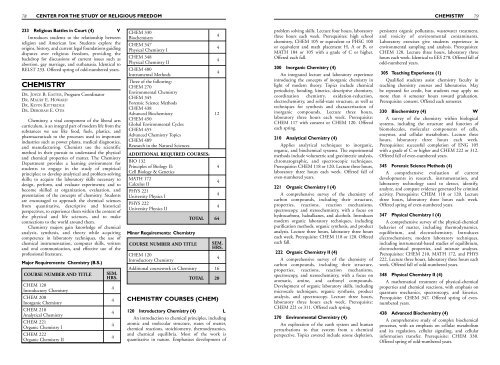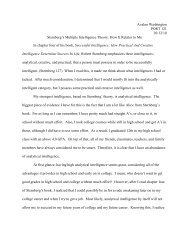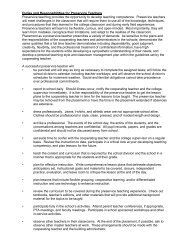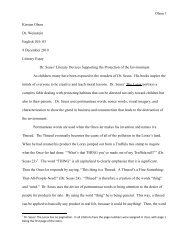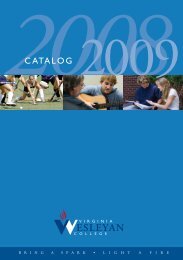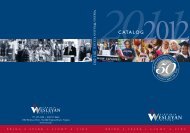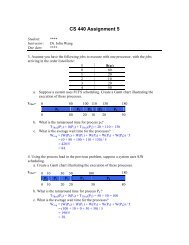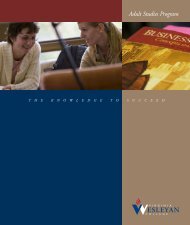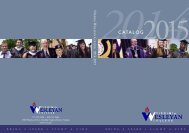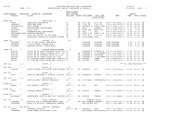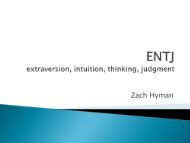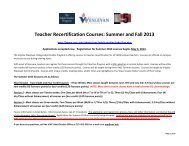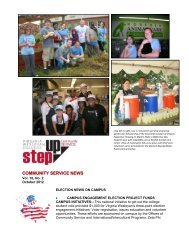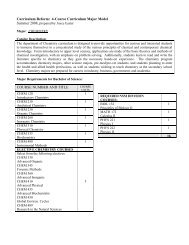76 BUSINESSCENTER FOR THE STUDY OF RELIGIOUS FREEDOM77335 Accounting Information Systems (4)Students develop a conceptual framework for thedevelopment, implementation, and evaluation of anaccounting information system. Primary topicsinclude system understanding and documentation,risk analysis, and typical accounting transactioncycles. The lab experience provides application ofsystem concepts to popular software applications.Prerequisite: MBE 203. Offered in selected WinterSessions.340 Forensic Accounting (4)The application of accounting methods to assist insolving economic-based crimes. The course includesdiscussion of criminal statutes relating to financialcrimes, fraud investigation and prevention,techniques used in solving financial crimes, andcurrent issues in financial investigation. Prerequisite:MBE 203. Identical to CJ 340. Offered spring ofeven-numbered years.343 Government andNot-For-Profit Accounting (4)A study of appropriate accounting for suchentities as governments, colleges, churches, hospitals,charities, and clubs. Prerequisite: MBE 203. Offeredspring of odd-numbered years.345 Managerial Cost Accounting (4)A study of cost accounting, budget analysis, andother advanced concepts used by manufacturers andother large businesses or non-profit organizations.Prerequisites: MBE 203 and 204. Offered fall of oddnumberedyears.348 Marketing Management: IntegratedMarketing Communications (4)An advanced marketing course in which studentsapply principles learned in earlier marketing andcommunication courses through the development ofa marketing plan. Prerequisite: MBE 316 or consent.Offered spring of odd-numbered years.350 Supply Chain Managementand Logistics (4)Provides an understanding of supply chainmanagement and logistics processes as they apply toboth service and manufacturing organizations.Special consideration is given to identifying ways inwhich the strategic use of supply chain managementcan create competitive advantages for firms.Prerequisite: MBE 301 or 316. Offered in selectedWinter Sessions.355 Auditing (4) WA study of the theory and procedure of publicauditing and internal auditing from the standpoint ofprofessional ethics, auditors, legal responsibilities,detection and control of fraud, client relationships,standards of reporting, and management advisoryservices. Prerequisites: MBE 203, 204. Offered fall ofeven-numbered years.373 Conflict Management (4) S,WExamines conflict processes within and betweenorganizations and alternative approaches to conflictmanagement, drawing on the contributions of severaldisciplines and experience in organization,community, and labor dispute management.Prerequisite: ENG 105 with a grade of C or higher.Identical to POLS 373. Offered each fall.389 Field Experience in Management (4)Students participate in a non-paid or paidinternship for at least 100 hours of field workundertaken after they complete a formal work andlearning contract. All internships are reviewed by thedepartment. Pass/fail grading. Prerequisites: juniorstatus; a 2.5 GPA; MBE 301, 316, or 322 preferablytaken concurrently. Offered each spring.400 Seminar in Managerial Ethics (4) WA course in which students construct forthemselves a conceptual framework for examiningand making decisions about ethical practices inmanaging organizations. Learning activities includeself-evaluation exercises, class discussions, readings onethical frameworks and applying them to cases,analytical issue papers, and oral reports. Prerequisites:ENG 105 with a grade of C or higher, MBE 301,316, 322, and senior status, or consent. Offered eachsemester.406 Senior Seminar:Management Strategy (4)I,WA case-oriented course that explains how and whya well-conceived, well-executed strategy nearly alwaysenhances a company’s long-term performance.Prerequisites: ENG 105 with a grade of C or higher,senior status, MBE 301, 316, 322, 400, and all othergeneral studies requirements completed at leastconcurrently. Offered each semester.407 Senior Seminar:Small Business Planning (4) I,WBy preparing a comprehensive business plan,students sharpen their understanding ofmanagement, integrate strategic thinking withoperational constraints, and explore the role of smallbusiness in the American economy. They synthesizeknowledge and skills gained in previous courses.Prerequisites: senior status, MBE 301, 316, 322, 400and all other general studies requirements completedat least concurrently. Offered intermittently.414 Internship Exploration and Design (4)Students find, design, and maximize theindependent learning experience to be undertaken inthe spring internship courses, MBE 416 and 417. Amajor outcome is the negotiation of a learning planagreement with a sponsoring organization.Prerequisites: a major in business with a 3.0 or higherGPA, all required major and general studiesrequirements completed at least concurrently, andadmission to the internship program. Offered eachfall.416 Management Internship (12)Students implement the work-and-learningagreements devised in MBE 414 for full-timeplacement (14 weeks or a minimum of 560 totalhours) as a professional in a sponsoring organization.They gain practical experience in applying previouslyacquired knowledge and managerial skills. Studentsself-evaluate and are evaluated by their organizationalsupervisor. Pass/fail grading. Prerequisite: MBE 414;must co-register for MBE 417. Offered each spring.417 Internship Seminar (4) IIntegrates management theory, especially ethicalanalysis and action, with general studies knowledgewhile enhancing business skills during a full-timeinternship. Weekly written and oral reports, twomajor reflection papers, and a strategic managementsimulation enhance learning. Prerequisite: MBE 414;must co-register for MBE 416. Offered each spring.490 Independent Study in Management (1-3)Students undertake an experience-based projectand/or do specific reading, research, and reportwriting on a topic in management not coveredthrough the regular curriculum. Requires theapproval of a supervising professor within thedepartment. Applications must be made no later thanthe end of the preceding semester. Credit: 1-3semester hours per semester; may be repeated for amaximum of 6 semester hours. Offered on demand,but preferably during the summer.INFORMATION SYSTEMSCOURSES (ISP)101 Fundamentals of Information Systems (4)Introduces students to the fundamental principlesand practices of utilizing information systems to helporganizations achieve their goals and carry out theirmissions. While the course serves as the introductorycourse in the Information Systems Programcurriculum, it is a suitable elective for any studentinterested in the subject. Students should have aworking knowledge of Internet use and computerapplications such as word processing, spreadsheets,presentation graphics, and e-mail. Offered eachsemester.105 Information Systems andComputer Applications (4)Students explore current topics in the field ofcomputer science/information systems beyond theintroductory level covered in CS 100, includingcomputer networks, Internet use, and ethical andlegal issues related to the use of informationtechnology. Students learn to use the more advancedfeatures of software applications such as wordprocessing, spreadsheet, database, and presentationprograms. Offered intermittently.CENTER FOR THE STUDYOF RELIGIOUS FREEDOM(Also see page 22)DR. PAUL B. RASOR, DirectorThe study of religious freedom is inherentlyinterdisciplinary. It is concerned with the critical FirstAmendment issues of free exercise of religion andchurch-state separation, as well as the larger political,social and religious contexts within which these issuesarise. This means that it draws on a wide range ofdisciplines, including history, law, philosophy,political science, sociology, and religious studies. Thestudy of religious freedom at <strong>Virginia</strong> <strong>Wesleyan</strong><strong>College</strong> may be engaged through the manyeducational programs offered by the Center for theStudy of Religious Freedom as well as through CSRFcourses.CSRF COURSES (CSRF)232 Religion and American Politics (4) VInvestigates the relationship between religion andpolitics in the United States, especially the role oftraditional religious identities and issues, whileacknowledging non-traditional religious movements,ideas, and issues. Emphasizes upcoming elections.Students are expected to be informed on the currentdebates in the various national elections which formbasis of class discussions and student presentations.Identical to RELST 232. Offered fall of evennumberedyears.
78 CENTER FOR THE STUDY OF RELIGIOUS FREEDOMCHEMISTRY79233 Religious Battles in Court (4) VIntroduces students to the relationship betweenreligion and American law. Students explore theorigins, history, and current legal foundations guidingdisputes over religious freedom, providing thebackdrop for discussions of current issues such asabortion, gay marriage, and euthanasia. Identical toRELST 233. Offered spring of odd-numbered years.CHEMISTRYDR. JOYCE B. EASTER, Program CoordinatorDR. MAURY E. HOWARDDR. KEVIN KITTREDGEDR. DEBORAH E. OTISChemistry, a vital component of the liberal artscurriculum, is an integral part of modern life from thesubstances we use like food, fuels, plastics, andpharmaceuticals to the processes used in importantindustries such as power plants, medical diagnostics,and manufacturing. Chemists use the scientificmethod in their pursuit to understand the physicaland chemical properties of matter. The ChemistryDepartment provides a learning environment forstudents to engage in the study of empiricalprinciples; to develop analytical and problem-solvingskills; to acquire the laboratory skills necessary todesign, perform, and evaluate experiments; and tobecome skilled at organization, evaluation, andpresentation of the concepts of chemistry. Studentsare encouraged to approach the chemical sciencesfrom quantitative, descriptive and historicalperspectives, to experience them within the context ofthe physical and life sciences, and to makeconnections to the world around them.Chemistry majors gain knowledge of chemicalanalysis, synthesis, and theory while acquiringcompetence in laboratory techniques, the use ofchemical instrumentation, computer skills, writtenand oral communication, and effective use of theprofessional literature.Major Requirements: Chemistry (B.S.)COURSE NUMBER AND TITLECHEM 120Introductory ChemistryCHEM 200Inorganic ChemistryCHEM 210Analytical ChemistryCHEM 221Organic Chemistry ICHEM 222Organic Chemistry IISEM.HRS.44444CHEM 3304BiochemistryCHEM 3474Physical Chemistry ICHEM 3484Physical Chemistry IICHEM 4804Instrumental MethodsThree of the following:CHEM 270Environmental ChemistryCHEM 345Forensic Science MethodsCHEM 438Advanced Biochemistry 12CHEM 450Global Environmental CyclesCHEM 455Advanced Chemistry TopicsCHEM 489Research in the Natural SciencesADDITIONAL REQUIRED COURSES:BIO 132Principles of Biology II: 4Cell Biology & GeneticsMATH 1724Calculus IIPHYS 2214University Physics IPHYS 2224University Physics IIMinor Requirements: ChemistryCOURSE NUMBER AND TITLECHEM 120Introductory ChemistryTOTAL 64SEM.HRS.Additional coursework in Chemistry 164TOTAL 20CHEMISTRY COURSES (CHEM)120 Introductory Chemistry (4) LAn introduction to chemical principles, includingatomic and molecular structure, states of matter,chemical reactions, stoichiometry, thermodynamics,and chemical equilibria. Most of the work isquantitative in nature. Emphasizes development ofproblem solving skills. Lecture four hours, laboratorythree hours each week. Prerequisites: high schoolchemistry, CHEM 105 or equivalent or PHSC 100or equivalent and math placement H, A or B, orMATH 104 or 105 with a grade of C or higher.Offered each fall.200 Inorganic Chemistry (4)An integrated lecture and laboratory experienceintroducing the concepts of inorganic chemistry inlight of modern theory. Topics include chemicalperiodicity, bonding, kinetics, descriptive chemistry,coordination chemistry, oxidation-reduction,electrochemistry, and solid-state structure, as well astechniques for synthesis and characterization ofinorganic compounds. Lecture three hours,laboratory three hours each week. Prerequisite:CHEM 117 with consent or CHEM 120. Offeredeach spring.210 Analytical Chemistry (4)Applies analytical techniques to inorganic,organic, and biochemical systems. The experimentalmethods include volumetric and gravimetric analysis,chromatographic, and spectroscopic techniques.Prerequisite: CHEM 118 or 120. Lecture three hours,laboratory three hours each week. Offered fall ofeven-numbered years.221 Organic Chemistry I (4)A comprehensive survey of the chemistry ofcarbon compounds, including their structure,properties, reactions, reaction mechanisms,spectroscopy, and stereochemistry, with a focus onhydrocarbons, haloalkanes, and alcohols. Introducesmodern organic laboratory techniques, includingpurification methods, organic synthesis, and productanalysis. Lecture three hours, laboratory three hourseach week. Prerequisite: CHEM 118 or 120. Offeredeach fall.222 Organic Chemistry II (4)A comprehensive survey of the chemistry ofcarbon compounds, including their structure,properties, reactions, reaction mechanisms,spectroscopy, and stereochemistry, with a focus onaromatic, amine, and carbonyl compounds.Development of organic laboratory skills, includingmicroscale techniques, organic synthesis, productanalysis, and spectroscopy. Lecture three hours,laboratory three hours each week. Prerequisite:CHEM 221 or 311. Offered each spring.270 Environmental Chemistry (4)An exploration of the earth system and humanperturbations to that system from a chemicalperspective. Topics covered include ozone depletion,persistent organic pollutants, wastewater treatment,and toxicity of environmental contaminants.Laboratory exercises give students experience inenvironmental sampling and analysis. Prerequisites:CHEM 120. Lecture three hours, laboratory threehours each week. Identical to EES 270. Offered fall ofodd-numbered years.305 Teaching Experience (1)Qualified students assist chemistry faculty inteaching chemistry courses and laboratories. Maybe repeated for credit, but students may apply nomore than 4 semester hours toward graduation.Prerequisite: consent. Offered each semester.330 Biochemistry (4) WA survey of the chemistry within biologicalsystems, including the structure and function ofbiomolecules, molecular components of cells,enzymes, and cellular metabolism. Lecture threehours, laboratory three hours each week.Prerequisites: successful completion of ENG 105with a grade of C or higher and CHEM 222 or 312.Offered fall of even-numbered years.345 Forensic Science Methods (4)A comprehensive evaluation of currentdevelopments in research, instrumentation, andlaboratory technology used to detect, identify,analyze, and compare evidence generated by criminalactivity. Prerequisite: CHEM 118 or 120. Lecturethree hours, laboratory three hours each week.Offered spring of even-numbered years.347 Physical Chemistry I (4)A comprehensive survey of the physical-chemicalbehavior of matter, including thermodynamics,equilibrium, and electrochemistry. Introduceselectrochemistry, modern laboratory techniques,including instrumental-based studies of equilibrium,electrochemical properties, and mixture analyses.Prerequisites: CHEM 210, MATH 172, and PHYS222. Lecture three hours, laboratory three hours eachweek. Offered fall of odd-numbered years.348 Physical Chemistry II (4)A mathematical treatment of physical-chemicalproperties and chemical reactions, with emphasis onquantum mechanics, spectroscopy, and kinetics.Prerequisite: CHEM 347. Offered spring of evennumberedyears.438 Advanced Biochemistry (4)A comprehensive study of complex biochemicalprocesses, with an emphasis on cellular metabolismand its regulation, cellular signaling, and cellularinformation transfer. Prerequisite: CHEM 330.Offered spring of odd-numbered years.


